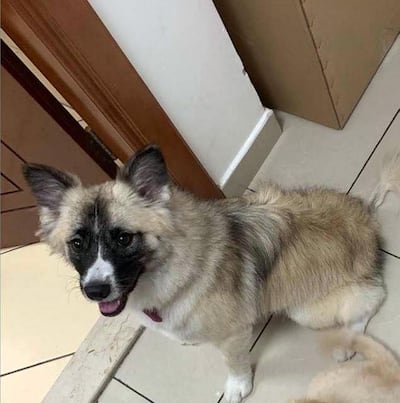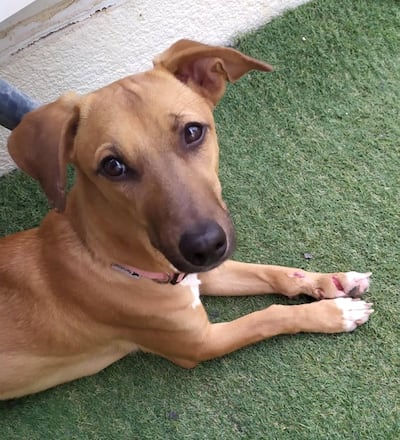“In an instant, she was gone.” That’s how Abu Dhabi resident Ahmed Saeed describes what happened when his dog Rina went missing during a past trip to Muscat.
Saeed was training his two canines about recall and sometimes kept them off leash. They were responding well, so he figured letting them out in an area that didn’t have too many people wouldn’t be an issue. As expected, they ran off, but returned when he called out to them a few minutes later. Rina then spotted a stray cat and chased after it. It wasn’t until about an hour later that Saeed realised he had a problem.
While Rina had run off multiple times in the past and has a “sensitive nose”, she usually returned within 30 minutes. This time it was different. Even though he drove around the neighbourhood looking for her, no one reported seeing Rina, much to his distress.
“I felt that it was my fault for letting her run [free] in an unfamiliar city,” Saeed says. “Also, I thought I rushed this step because Rina is not obedient enough like my other dog off leash.”
The next day, he went to all vets, pet stores and markets in the city. He put up flyers and approached as many people as he could in the neighbourhood. “I checked the surrounding blocks, on foot and by car,” he says. “I had some friends and my parents driving around to cover more ground, but nothing.”
After nine days in Muscat, Saeed had to return to Abu Dhabi. It broke his heart to come home without his 3-year-old dog, and he knew he couldn’t give up on her. After almost a month, he received a tip from a rescue group in Oman that brought him back to Muscat and eventually reunited him with Rina.
This story may have a happy ending, but losing a pet is a tense and heart-wrenching time. Here are some boxes to check if yours goes missing.
Ensure your pet is identifiable
One of the easiest things an owner can do is be proactive and microchip their pets. A microchip is an implant that goes under the skin, and is used as a means of identifying the animal. The pet will be stamped with a unique number linked to its owner, so it’s also a way to prove ownership in case of any legal disputes.
Microchipping can be done as early as the first vaccination. However, while it’s a good start, it’s not a perfect system because currently there is no central database connecting all vets to one another.
For instance, Rina was microchipped but she also had a dog tag on with Saeed’s UAE phone number. This, Dubai animal rescuer Nathalie Grall believes, is equally important. “A collar with your phone number is the only reliable way to find pets if they are lost,” she says.
She further notes that if pets change hands, the information may not be transferred over, meaning a microchipped pet can have its former owner’s contact details, so it’s vital to update the information. “There was a Turkish angora found neglected by a lady,” Grall says.
“After investigating its microchip, we contacted the first owner. She said she’s given [the cat] to a family, who had passed it on to another colleague. After 24 hours at the vet, the cat passed away.”
An up-to-date microchip would have prevented the runaround and likely could have saved precious time when it came to getting in touch with the current owner about what to do about the cat’s state. Sadly, it was too late in this case.
Turn to social media
Social media has proven to be a helpful tool for finding a lost pet. Saeed credits Facebook for helping him find Rina, but also for reminding him to not give up searching. “I did [feel like] giving up after two weeks,” he admits, “But on the Facebook page Omani Dog Rescue, there was a German shepherd who went missing for 54 days before he was found, so that gave me hope.”
There is no shortage of groups dedicated to helping reunite lost pets with their owners. In the UAE, these include Lost and Found Pets in the UAE, Abu Dhabi Missing Pets, Dubai Pet Lost and Found, and Dinkys Lost and Found Cats.
If your pet goes missing, post photos with details of any identifying features. As well, for those who come across lost pets and bring them for a microchip check, only post the last four digits and let the owner contact them with the rest of the number to confirm ownership.
In 2017, Dubai cat Dinky made headlines for disappearing after he was supposed to be flown out on an Emirates flight to Gatwick. When the flight landed, the cage was empty, but no one knew what had happened. After 60 days, and thanks to the help of social media, a similar-looking cat was found in Al Barsha and brought to the Dubai Municipality where the microchip confirmed it was indeed Dinky. Soon after, he was reunited with his owners in the UK.
Dinky’s Dubai caretaker Donna Louise Baily remembers the urgency she felt to find her parents’ cat. She says posting in local social media groups, including ones not related to animals – about “a small cat with a funny tooth” – helped to spread word quicker.
“Post on as many social media groups, especially lost pets and local groups wherever the pet has gone missing. For example, [I approached] Mirdif Mums and even school pages,” she says. “Social media was how we found Dinky.”

Keep on looking
While posting on a social platform is a good way to raise awareness, going out to physically look for a lost pet is equally as important, especially in and around neighbourhoods where they got lost or ones they are familiar with.
“I made hundreds of posters and put them up in shops around Dubai Airport and I had people from around Gatwick Airport posting for me too, as we didn’t know if he was in Dubai or London,” says Bailey.
Dubai resident and animal lover Laura Maria, who was part of a search crew for a missing puppy named Nini, also knows the importance of being active. Nini was part of five pups who had been recently rescued and had been put on a trial adoption.
However, Maria’s jubilation soon turned to worry when she got a call not too long afterward.
“I was so excited that we found the right family for one of them,” she says. “We left the pup in trial adoption, but after just a couple of hours I got a call that she had been lost on her walk as the harness bought by [the potential owners] was too big on her. We got there immediately to start the search.”
Unfortunately, finding Nini proved to be a challenge. There were construction sites, bushes, and underground parking lots that she could have potentially hidden in. Nobody had seen her, and several days went by.
“We didn’t give up and for 10 days straight we were there day and night, calling out and searching, distributing flyers and asking every single person we saw around. We expected the family to join us and help look for her, but sadly that didn’t happen,” she says.
On the 10th day, a rescue group set up a search and about 15 volunteers came out late at night to look for the missing pup, something Maria says she will forever be grateful for.
“We spotted her in a construction site nearby, set up a trap and waited. It was the longest 10 minutes of our lives. She had fleas, scratches, wounds and two deep injuries on her paws. But she was so happy to see us and settled back very quickly,” Maria says.
Don’t give up hope
Saeed, Bailey and Maria all offer the same advice for owners of missing pets: don’t give up. Lost animals can feel overwhelmed by their new surroundings, but generally won’t wander away too far from spots they know or were last taken to. It is vital to go out and look for them, as well as update their microchips and collars in the hope they will be picked up by a kind stranger.
“Pets go into survival mode when they’ve spent more than three or four days lost, to which they may not respond to your voice or scent, therefore making it harder for you to find them. But that shouldn’t discourage you from searching every day and asking for help from the pet community,” says Maria. “There have been cases of pets reuniting with owners after months and even years, so [believe] it will happen.”




